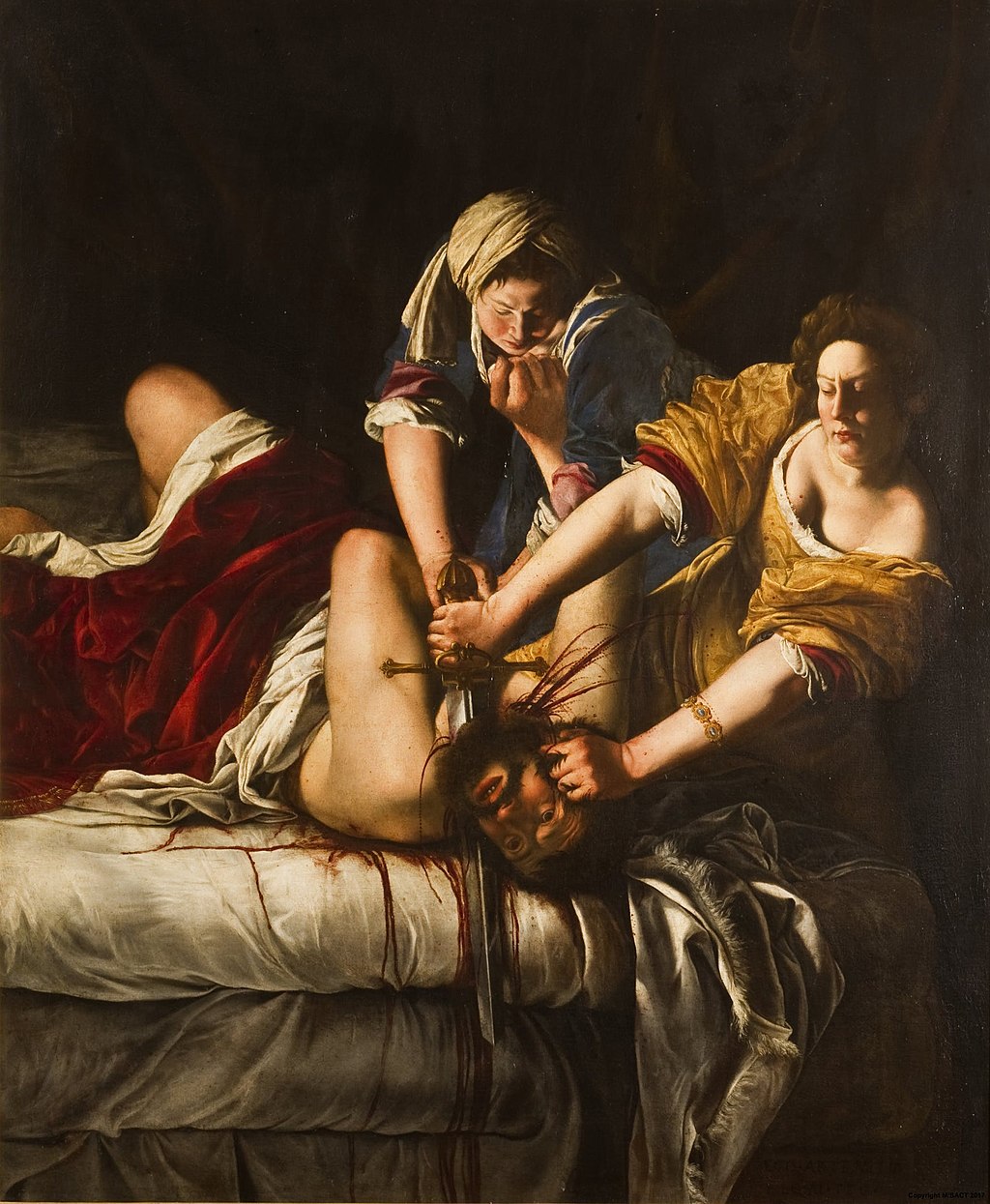
Deborah, Yael, Judith and Me–“Sheer Zans” Who Slay
Lately, feeling middle aged and untethered— doing yet another Marie Kondo at home after the marriage of one child, the move-outs of two more, the move-back of a fourth, a rebranding at work, being hospitalized and diagnosed with two chronic conditions—I found myself searching feverishly for a new metaphorical cape to wrap myself in. Matriarch? Something else?
Then, in December, I attended a lecture about the association of Hanukkah to the story of Judith, a rich beautiful widow who entertains the enemy Holofernes, feeds him some milk and salty cheese, knocks him out, and decapitates him to save the Israelites. We also learned that, in another story, in the Tanakh which is coming up in February associated with parshat Beshalach, Yael feeds Jabin milk, puts him to sleep, drives a tent peg through his head and kills him. Deborah the Judge and prophetess predicted this would occur.
Sitting in the audience, a Persian Jew in an Ashkenormative setting, I thought I had already found my metaphor. I already had so many titles: Woman. Lawyer. Mediator. Trustee. Writer. First Generation American. First born daughter. Jew. Persian. Seeker. Mother. Spouse. Wife. Daughter. Sister. Friend. Mother-in-law. Daughter-in-law. Cousin. Aunt. Machetanister. Civil Libertarian. Activist. Networker. Outsider. Insider. Intermittent Faster. . . Exhausted. And, cautious: Metaphors are safer and cheaper than injections or cosmetic surgery. Perhaps it was this very same over-compartmentalization which left me feeling like a piece of very intricate, effete luggage with too many pockets, drawers, locks and keys to readily store my stuff? In frustration, it is easier to let my person pile up on the floor. I felt wrinkled and rumpled.
So, ever the existentialist, wordsmith and accessory freak, I had been asking: what to call myself? Since the Patriarchy just won’t quit and the Supreme Court overturned Roe, I had landed on “Matriarch,” reasoning that as the disarming of the patriarchy in my lifetime (or even, likely, my son and daughters’) ain’t happening, my best hedge is Matriarchy. I hoped “Matriarch” might suffice to encompass all my component parts, all those seemingly disparate titles and identities, in one neat word. As in, “Hello, nice to meet you, my name is Rebecca; I am a Matriarch. Keep your grimy hands away from the crown.”
But the crown did not lie easy on my head; instead, it wore on me. I knew that there are women who do not define themselves by breeding or by mothering or relationship. I am not one of those women. A first-generation American, I have been defined, and perhaps circumscribed, by relationships to family, tribe, ethnicity, Judaism. I strive to stretch, to keep it all moving with me, alternately woven; darned; ironed; repurposed; embroidered; patched; and threadbare, as integrated as possible, even as I feel eroded. Thus, my matriarchal crown felt more like a dinged ornament from birthday parties past, missing rhinestones, cracked, scratching my scalp.
As it happened, I was the only Persian Jew in attendance at the lecture, and the information about eating dairy during Hanukkah was new to me. I am Mizrahi and I didn’t grow up hearing about dairy on Hanukkah. For a few minutes I felt othered and asked myself why I had attended the lecture at all. Moments later, my internal Mizrahi Matriarch had a massive mental orgasm then and there! I had found my Metaphorical Mantle… a phrase that it works in both Persian and Jewish traditions…No Couturier could do it better: “Sheer Zan.”
You see, in that Ashkenormative setting, unbeknownst to the teachers, I experienced a series of exquisite moments of realization. My knowledge of Farsi helped me understand the stories, perhaps better, even though, initially, I’d felt excluded by the dairy minhag of Hanukkah.
In Farsi, “Sheer Zan” is an expression used to describe a fierce woman, literally “sheer” lion “zan” woman, a lioness. Sheer Zan is used to describe women, young or old, whether bearers of children or not, of any religion or class. Women such as those fighting for “Zan Zendegee Azadee” (Women! Life! Freedom!) against the mandatory Hijab and morality police in the streets of Iran today. Sheer Zan is also used to describe iconic countercultural Persian Jewish Matriarchs I have heard respectfully eulogized with awe; women who managed not only to cook and clothe their large families, but, also, to be bosses, agents and narrators of their own lives—not passive handmaidens.
To my Jewish ear, though, Sheer Zan, has unmistakable double entendres and rich additional meanings: in Farsi, “sheer” is not only “lion” but, also, “milk” (with the identical spelling and pronunciation). Likewise, “zan” is not only “woman” but “hit a target.”
Therefore, it hit me that the Tanakh provides us not only named Matriarchs but perhaps even more: Sheer Zans: Deborah, Yael, and Judith. Those women didn’t just use milk to nurse their young, or to be their husbands’ foils. They flipped the nursing metaphor to literally hit their marks. They slayed enemies with their milk and wits, each with agency of her own.
Seems pretty apt to me. So, in time for Parshat Beshalach this winter, I hope you will join the women of the Tanakh, the women of Iran, and me to try your own warm, powerful, all-embracing Sheer Zan mantle on for size to slay–metaphorically, of course.



